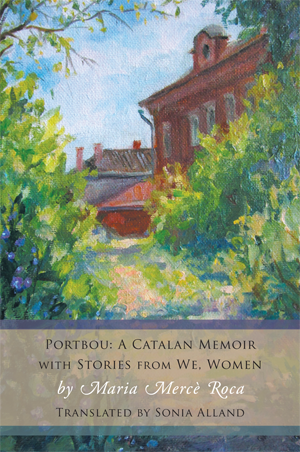Page last updated: September 24, 2020
All pages copyright © 2020 by Pinyon Publishing

Portbou: A Catalan Memoir
with Stories from We, Women
by Maria Mercè Roca, Translated by Sonia Alland
Maria Mercè Roca’s tender narratives illustrate the potency of language:
“the supplications were like a song and if I said them over and over I became drunk from the rhythm and the words, in a kind of ecstasy.”
A profound security is derived through shared conversations, as when her father picks her up from school:
“You carry the suitcase and, at first, we walk fast without saying anything as if we were afraid they’d make us go back. When we’ve covered a bit of distance we look at each other and begin to laugh. … I calm down and … nothing seems so tragic any more.”
As well as wounds incurred and deepened by silence. From a trauma of police brutality scraping at the interior mind and body—to a child punished by her mother’s refusal to speak or look at her. Many layered, the architecture of steps, ceilings, and train tracks structure the waxing and waning of human life and death.
* * *
“A beautiful and poignant letter to her father. The moving experience of the first seventeen years of the life of the author from Portbou, narrated in her style, diaphanous and intense.”
—MARIA BARBAL, Catalan Writer, Author of Stone in a Landslide
 Maria Mercè Roca is a prominent Catalan writer who has published numerous novels, books of short stories, texts for young people, and has written for Catalan television. She has received some of the most prestigious prizes in Catalonia for her work. After recent years in the Catalan Parliament as a member of a party promoting independence, Ms. Roca has returned to writing full time with the publication of another novel, Al final, t’agradaré (You Will Like Me in the End).
Maria Mercè Roca is a prominent Catalan writer who has published numerous novels, books of short stories, texts for young people, and has written for Catalan television. She has received some of the most prestigious prizes in Catalonia for her work. After recent years in the Catalan Parliament as a member of a party promoting independence, Ms. Roca has returned to writing full time with the publication of another novel, Al final, t’agradaré (You Will Like Me in the End).  Sonia Alland translates from the French and the Catalan: She has translated works by the French writer, Marie Bronsard, and the poetry in French by Salah Al Hamdani. From the Catalan, Ms. Alland has done a selection of Maria Mercè Roca’s short stories and is translating selected poems by the Catalan poets, Salvador Espriu and Narcis Comadira.
Sonia Alland translates from the French and the Catalan: She has translated works by the French writer, Marie Bronsard, and the poetry in French by Salah Al Hamdani. From the Catalan, Ms. Alland has done a selection of Maria Mercè Roca’s short stories and is translating selected poems by the Catalan poets, Salvador Espriu and Narcis Comadira.

